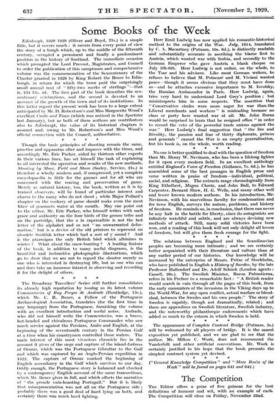Herr Emil Ludwig has now applied his romantic-historical method to
the origins of the War. July, 1914, translated by C. A. Macartney (Putnam, 10s. 6d.), is distinctly readable and substantially accurate in ascribing the blame first to Austria, which wanted war with Serbia, and secondly to the German Emperor who gave Austria a blank cheque on July 5th-6th. Herr Ludwig is not unfair, on the whole, to the Tsar and his advisers. Like most German writers, he refuses to believe that M. Poineare and M. Viviani wanted peace—though it seems obvious that they must have done so—and he attaches excessive importance to M. Isvolsky, the Russian Ambassador in Paris. Herr Ludwig, again, tries very hard to understand Lord Grey's position ; but misinterprets him in- some respects. The assertion that "Conservative circles were more eager for war than the Liberal merchants and workers" is misleading because no class or party here wanted war at all. Mr. John Burns would be surprised to learn that he resigned office "in order to record the veto of the powerful trade unions against the war." Herr Ludwig's final suggestion that "the lies and frivolity, the passion and fear of thirty diplomats, princes and generals" caused the War is an empty generalization, but his book is, on the whole, worth reading * * * *








































 Previous page
Previous page